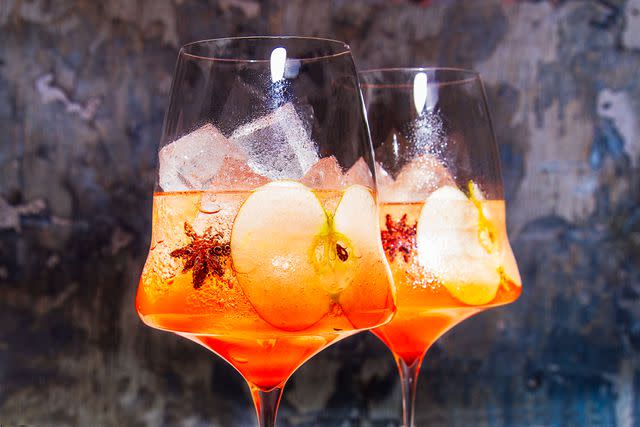Apple Brandy vs. Applejack: What's the Difference?
We break down what sets these apple-based spirits apart and the bottles to try.

Food & Wine / Tamworth Distilling
Apple-based spirits don’t get the respect they deserve. Sure, ardent fans appreciate their versatility in cocktails and how delicious they can be when sipped on their own. But their grape-based cousins, Cognac and Armagnac, garner the most attention.
Each autumn, however, during peak season, apple beverages finally get their due. The two most commonly known apple-based spirits categories are applejack and apple brandy.
Related: How to Drink Calvados, France's Signature Apple Brandy
Though not always the same thing, sometimes, well, they are. All applejack is apple brandy, but not all apple brandy is applejack. Both are made from apples, but where they’re produced, how they’re produced, and what they’re produced from can differ.
What is applejack?

Food & Wine / Laird & Company
“Applejack gained popularity and notoriety in colonial-era America, and later became important as a pragmatic approach to alcohol production and storage [during Prohibition],” says Jamie Oakes, distiller at New Hampshire’s Tamworth Distilling. “This is because the early definition of applejack included ice- or freeze-jacking as a way to strengthen hard cider without the means of distillation.”
Given the different freeze points of water and ethanol, “all that is required is freezing temperatures and a barrel or vessel to ice out the water. What is left that doesn’t freeze [has a] higher percentage of alcohol,” says Oakes.
This makeshift distilling process pumped up the alcohol content and made the resulting liquid more stable during transport.
Today, however, according to the Alcohol & Tobacco Tax & Trade Bureau (TTB), the federal agency that regulates the production and sale of alcoholic beverages, “applejack is synonymous with apple brandy in the United States.”
What is apple brandy?

Food & Wine / Watershed Distillery
Apple brandy is distilled from a mash of fermented apples. Within the category, specific varieties reside, like Calvados, which must be produced in Normandy, France.
Compared to applejack, apple brandy “has more nuanced apple flavors and is regarded as older and [more] bold,” says Oakes. “This can come across as more stewed apple, deeply floral, and more complex.”
Applejack tends to be brighter and more fruit-forward. The flavor and aroma profile of apple brandy depends greatly on factors like the type of apples used in its production and how the spirit is aged.
Applejack and apple brandy in cocktails

Matt Taylor-Gross / Food Styling by Liberty Fennell
Whether on their own or in cocktails, applejack and apple brandy are remarkably versatile. Either make a terrific base for classic cocktails like the Jack Rose or Sidecar, or even as a whiskey substitute in an Old Fashioned.
“New Orleans was once hugely influenced by French brandy imports,” says Oakes. “Standards such as Corpse Revivers, or a spin on the Vieux Carré, could also feature apple brandy.”
Applejack and apple brandy bottles to try
Tamworth’s VSOP Bottled in Bond apple brandy is a deeply complex distillate that at 50% ABV makes it an excellent choice in cocktails. Tamworth’s Old Hampshire Blended Applejack, “is a more playful entry into cider-based spirits,” says Oakes.
Ohio-based Watershed Distillery’s two-year-aged apple brandy is quite different from Tamworth’s offerings. It’s more savory and, despite its lower proof, more spirit-forward.
New York’s Rootstock Spirits makes a two-year-old applejack aged in former bourbon barrels from a well-known Kentucky whiskey maker. This expression is bright and spicy, and it’s an excellent swap in most whiskey-based cocktails.

Food & Wine / Rootstock Cider & Spirits
Apple brandy has benefited from the popularity of whiskey and other barrel-aged spirits.
“As the boom of bourbon has elevated U.S. whiskey, it also opened barrel-aged spirit lovers to explore other classifications in spirits,” says Oakes. “What they often love in mature whiskey, brandy has, and then some.”
Whether you reach for a craft producer like Tamworth, a better-known name like Laird’s, or a classic Calvados producer like Boulard or Camut, apple-based spirits are an easy way to improve the breadth and quality of your neat sipping and cocktail mixing, regardless of the what the calendar reads.

 Yahoo Lifestyle
Yahoo Lifestyle 